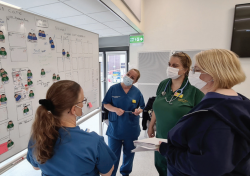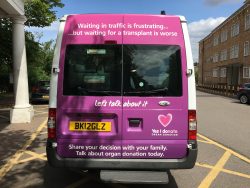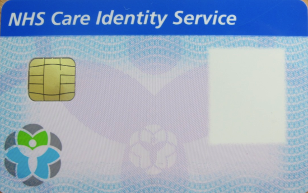Monthly archives: July 2022
Heartbeat: SWB puts emergency planning to the test

Benjamin Franklin once said, ‘Failure to prepare is preparing to fail’. The saying couldn’t be more relevant for our teams across SWB and the wider NHS.
As a healthcare provider, we must plan for and be able to respond to a wide range of incidents and emergencies that could affect health or patient care. Examples of incidents could be extreme weather conditions, a transport accident or a terrorist act.
Within the NHS, this area of work is called emergency preparedness resilience and response (EPRR). Given that we could face unknown threats at any time, we have a team in place that oversee this crucial piece of work. Their role ensures we have the right plans in place to respond to or manage incidents. Plus, they work with teams to ensure their business continuity plans are in place and that they stand up to the pressures critical incidents would potentially place on our organisation and services.
Plans such as these are not unique to the NHS. The emergency services, local authority departments, fire service, police and voluntary organisations also have plans to respond to emergencies 24 hours a day, 365 days a year.
With the Commonwealth Games on the horizon, we recently held two mock emergency planning sessions involving clinical and operational colleagues from frontline teams to our executive team. Both sessions were part of NHS planning activity and focused on terror threats, but each had a different focus.
The first session took place in April. The purpose of this session was to test emergency plans, our command and control arrangements and how we performed our roles and executed our responsibilities, including handling press queries.
Our second session in May had a clinical focus, and teams dealt with a trauma threat. The session aimed to build on our existing knowledge and identify gaps in how we respond. Clinical colleagues used the emergo train system to triage and treat patients within their teams.
Caroline Rennalls, Assistant Director of Operations and Resilience Management, explained: “Holding these sessions was essential as it enabled us to test drive all of our plans and processes. Putting our theory to the test is vital as we need to be able to stand up to any potential threats.
“All colleagues are asked to familiarise themselves with their business continuity plans. If anyone has any questions, please feel free to email swbh.EPRRAdmin@nhs.net.”
Water issue now resolved in critical care, Sandwell
As you many have been aware, there was a temporary loss of water in parts of critical care, Sandwell. This has now been resolved and the water will gradually start to flow through the system.
We advise colleagues to run the water for a couple of minutes if there isn’t a consistent flow of water.
Should any colleague feel their water is still not fixed in their ward or area, they should call the EQUANS helpdesk on ext. 4444.
We apologise for any inconvenience this may have caused.
Reduced shuttle bus service between 2.30pm – 3.30pm

There will be only one shuttle bus running today (Monday 11 July) between 2.30pm – 3.30pm so please keep this in mind when planning your journeys across site when using the shuttle bus service.
Note: Colleagues must wear face masks on the shuttle. If you do not have a face covering they can be obtained from entrances on both sites or upon entry onto the shuttle.
We apologise for any inconvenience this may cause.
Self service smart card management – putting colleagues back in control
 Colleagues who find their NHS smartcard locked or requiring renewal are now able to unlock and renew their cards without needing IT support – simply by logging in to a self service portal.
Colleagues who find their NHS smartcard locked or requiring renewal are now able to unlock and renew their cards without needing IT support – simply by logging in to a self service portal.
The Care Identity Service (CIS) is now offering an online portal that colleagues across the Trust can access which gives them the ability to unlock and renew their smartcards from the comfort of their ward or clinic area, without needing to attend the IT department.
Every 100th colleague to register on the smart card self service portal will be invited in to pick a free item from the new IT Shop.
Registering for the self service portal
To use the service, colleagues must ensure they are registered on the self service portal by logging in at https://portal.national.ncrs.nhs.uk/portal/dt . Simply follow the onscreen prompts, enter your details and choose from a set of security questions and you will be registered on the self service portal.
Smartcard Self-Service Registration Process Guide
Unlocking your smartcard
If you subsequently need to unlock your card, you can do so by going to https://uim.national.ncrs.nhs.uk/selfservicewebapp/unlockCardStart. Confirm your identity by answering the security questions set when you registered and wait for a notification for the smart card unlock pin to be sent to your email address.
Smartcard Unlocking Process Guide
Renewing your smartcard
Smartcard renewals can be completed by going to https://uim.national.ncrs.nhs.uk/urswebapp/?operation=selfRenewSmartcard and following the onscreen instructions to ‘renew certificate’.
When logging in to the self service portal, ensure you are using Internet Explorer or Microsoft Edge.
Smartcard Renewal Process Guide
The IT Servicedesk can be contacted for support on ext. 4050 (0121 507 4050) if you are unable to complete registration, unlock or renewal processes using the self service portal.
Medical photography – limited service availability at Sandwell
Due to unforeseen circumstances, the medical photography department at Sandwell are operating a limited service this week.
Urgent requests for medical photography support should be called in to the City photography studio on ext. 4345.
We apologise for any inconvenience.
Have you tested your glucose and ketone meter?
As you may be aware, the quarterly distribution for glucose and ketone external quality assurance solution has been issued and should now have reached your department, ward or area.
Please ensure you test the external quality assurance solution according to the enclosed instructions and record and return the results to point of care using the details provided by Tuesday 19 July.
Note: Participation in the scheme is expected for all areas with a glucose meter.
Should you not have received you meter or for more information, please call ext. 5352.
New chapter for the Black Country health and care system
As you may be aware, we recently established our Integrated Care System (ICS). Our ICS will bring providers and commissioners of NHS services together with local authorities and other local partners to plan and deliver joined up services and to improve the lives of people who live and work in the Black Country.
The Black Country ICS will be made up of two key bodies – an NHS Integrated Care Board (ICB) and an Integrated Care Partnership (ICP).
ICBs will take on functions from the current NHS Clinical Commissioning Groups (CCGs), which have now been dissolved, and have greater strategic responsibility for setting healthcare strategies for their local system.
The new Black Country ICB, which has been formally established, will take on the existing responsibilities of the NHS Black Country and West Birmingham CCG, and will be responsible for planning and coordinating services on behalf of 1.26 million local people, as well as managing the local NHS budget.
Be sure to check out this short video on how the NHS works and more importantly how it will be changing.
Chief Executive’s Message – Friday 8 July
After months of intense scrutiny over the construction programme for the Midland Metropolitan University Hospital, I am pleased that this week we have been able to announce the confirmed arrangements with Balfour Beatty to ensure the building is completed before the end of 2023. As you know there have been many factors impacting on the development, not least the COVID-19 pandemic and issues affecting the construction industry and supply chain. This review, that has been led by the national New Hospital Programme team, enables us to reset our planning so that we can ensure we are on track to open in Spring 2024. We continue to have support from the national team as the building continues to progress, and we welcome their expertise.
It is down to us to continue to press ahead with the significant transformation required across many of our clinical services. The acute care model has been designed and approved. By now each service should be clear on what the move to MMUH means, and what changes need to be made so that we can be ready in time for opening. We have the funding agreed for the first phase of recruitment to around 100 new posts that are required to meet the needs of our patients. The next part of the workforce plan is to put in place the arrangements to manage these changes in the right way, so that everyone is engaged, informed and has opportunities to contribute. Although your service or team may not be changing significantly, all of us will be affected by this new model of care.
Midland Met is and always will be “more than a hospital”. For the hospital to work well, we need to make sure that we have the right investment in community services and primary care that are supporting people in their own homes or in community settings wherever possible. Some of the biggest transformations will be in those services.
We took the opportunity this week to celebrate the NHS birthday by sharing more information about Midland Met. Hopefully those of you who managed to grab an ice cream also had the chance to talk to a colleague about the new hospital. Staff Q&A sessions, “lunch and learns” and information in your areas will continue to be shared so that you can keep up to date.
Wellbeing activities have also been at the forefront of this week’s events demonstrating the range of support that is on offer to all colleagues whether that is to keep you healthy, kick start your own wellbeing programme or signpost you to further help and advice.
The highlight of the NHS Birthday celebrations for me has been to see and read the amazing cards and letters of thanks that have been written for our NHS by pupils at our local primary and secondary schools. Amidst our often challenged working days it can be easy to lose sight of the immense gratitude, respect and admiration that people hold for all who work in our Trust and for the NHS as a whole. I will leave you with just a snapshot of these heart-warming messages that we will get displayed across the Trust.
“Thank you for your services to Great Britain. You save hundreds of lives every day by putting your lives on the line to do so.”
“You invest your blood, sweat and tears into the heartbeat of this country.”
“We used to clap on our doorsteps for you but we are still clapping even if you don’t see it. What would we do without you?”
“My younger brother has spent many times in hospital and the NHS have helped us massively. You deserve the world for the hundreds of lives you have saved.”
Happy NHS Birthday to all of you!
Richard
Phishing for your login details – do you know what to look out for?

We have recently seen a significant increase in the number of malicious emails and messages being sent to colleagues at the Trust which are designed to steal account login information or infect devices with malware.
These messages are often sent either as emails, text messages or phone messages and are crafted to encourage you to follow a link or open an attachment.
Colleagues must remain vigilant as staff at our Trust have fallen victim.
Whilst NHSMail and providers do monitor and block malicious content, it is inevitable that some may pass through.
We advise:
- Be suspicious of emails that ask you to check, renew or share your logins or passwords. Some may link through to pages that look like legitimate NHS login pages.
- Don’t open attachments or click on links in emails without first establishing they are legitimate – for example, were you expecting to receive the email?
- Hover over links (without clicking) to see if the link looks legitimate – in many basic Phishing attempts, the actual link differs from the one you see in the email
- Check the sender of the email – do you know the sender? Be wary if not, and try to verify the sender
- If the content of the email tries to persuade you to do something that seems too good to be true, it probably is
- If the email claims to be from an official source, it will likely have graphics and images. Do they look legitimate? An official source will never ask you to share personal details or login credentials
- Check for spelling and grammatical errors in emails – these are often a tell-tale sign of spam.
If in any doubt, do not interact with the message and contact the IT service desk on ext. 4050 (0121 507 4050).
Sandwell pathology lab now back operating as business as usual
The issues within the chemistry laboratory at Sandwell Hospital with equipment, the refrigerated sample storage unit and IT have been fully resolved. We are pleased to state the service is now operating business as usual.
← Older items Newer items →